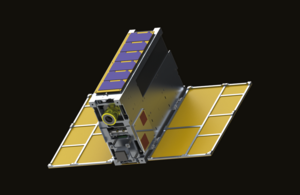Work-in-Space News2024-10-14 14:25:23
The UK is to collaborate with Canada on the Redwing microsatellite Space Domain Awareness (SDA) mission scheduled to launch in 2027.
Redwing will track objects in congested orbits with improved sensors, and provide near real-time tasking in response to evolving space events.
Redwing, which is the size of a small washing machine, will be directed and tasked by the Department of National Defence’s science and technology organisation, Defence Research and Development Canada (DRDC). The satellite will itself deploy a smaller nanosatellite that will incorporate a payload from the UK’s Defence Science and Technology Laboratory (Dstl) on behalf of the Ministry of Defence (MOD) and UK Space Command.
Dr Gemma Bagheri, Dstl Space Research and Development Programme Manager, commented:
Space is increasingly congested and it is vital that we keep pace with new and emerging threats. The collaboration with our Canadian partners will enable us to improve the characterisation of objects and maintain security in space to protect our mutual interests.
The nanosatellite, roughly the size of a cereal box and known as Little Innovator in Space Situational Awareness (LISSA), will incorporate as its primary payload a Dstl experimental short wave infrared (SWIR) camera. Once separated, Redwing and LISSA will fly in tandem in sun-synchronous low Earth orbit, approximately 575km above the Earth and up to 200km apart.
The mission will assess the capabilities of the SWIR camera with particular focus on the South Pole of Earth, where the glare from the illuminated Antarctic ice sheet can hinder object identification in orbit. Space objects over the Earth’s South Pole is less monitored than the North Pole and the mission will inform future space surveillance considerations based on findings from the mission.
This international research cooperation between the countries provides the opportunity for joint collaboration and for developing prototype infrastructure and data processing architecture.
Magellan Aerospace will design, build, prepare for launch, and operate the Redwing microsatellite and LISSA nanosatellite. LISSA will be built by the University of Manitoba. Bornea Dynamics has been contracted by Dstl to produce and qualify the SWIR camera payload hardware.
Scott McLelland, DRDC Director of Research and Development for the Defend North America strategic focus area, commented:
The space domain continues to change and evolve and requires space faring nations to innovate to keep informed of the security situation in the space domain. DRDC is thrilled to have Dstl participate in the Redwing mission to help grow both nations’ defence space programs.
